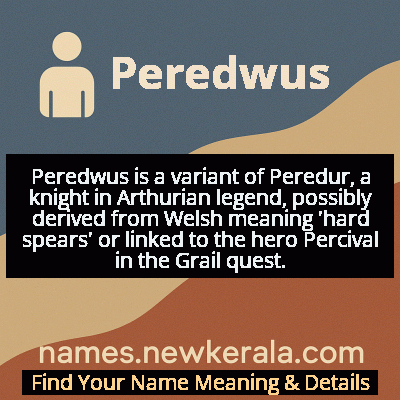Peredwus Name Meaning & Details
Origin, Popularity, Numerology Analysis & Name Meaning of Peredwus
Discover the origin, meaning, and cultural significance of the name PEREDWUS. Delve into its historical roots and explore the lasting impact it has had on communities and traditions.
Name
Peredwus
Gender
Male
Origin
Arthurian
Lucky Number
3
Meaning of the Name - Peredwus
Peredwus is a variant of Peredur, a knight in Arthurian legend, possibly derived from Welsh meaning 'hard spears' or linked to the hero Percival in the Grail quest.
Peredwus - Complete Numerology Analysis
Your Numerology Number
Based on Pythagorean Numerology System
Ruling Planet
Jupiter
Positive Nature
Optimistic, inspirational, and creative.
Negative Traits
Scattered, exaggerating.
Lucky Colours
Yellow, gold, purple.
Lucky Days
Thursday.
Lucky Stones
Yellow sapphire.
Harmony Numbers
1, 2, 9.
Best Suited Professions
Arts, writing, communication.
What People Like About You
Creativity, optimism.
Famous People Named Peredwus
Peredwus ap Eliffer
Brythonic King
Ruled Ebrauc and fought against Angle invaders in northern Britain
Peredwus Long-Knife
Arthurian Knight
Featured in early Welsh Arthurian tales as a distinguished warrior
Peredwus of the North
Celtic Chieftain
Led British resistance during the Saxon expansion period
Name Variations & International Equivalents
Click on blue names to explore their detailed meanings. Gray names with will be available soon.
Cultural & Historical Significance
In Arthurian tradition, Peredwus serves as a bridge figure connecting the historical post-Roman British leaders with the fully developed Arthurian court of medieval romance. His character reflects the Celtic concept of kingship, where martial prowess, protection of the people, and maintenance of tradition were inseparable. The preservation of his name in Welsh genealogies and triads demonstrates how historical figures were transformed into legendary heroes, their deeds amplified through oral tradition and later literary elaboration. Peredwus represents the Celtic ideal of the ruler who combines military strength with cultural stewardship.
Extended Personality Analysis
The name Peredwus evokes personality traits centered around leadership, protection, and traditional values. Individuals with this name are typically perceived as natural leaders who command respect through competence and character rather than authoritarianism. They possess a strong sense of duty and responsibility, often putting the needs of their community or family before their own interests. The historical associations with battlefield leadership suggest someone who remains calm and decisive under pressure, capable of strategic thinking in challenging situations.
Beyond the martial connotations, Peredwus suggests a person of depth and tradition, someone who values heritage and cultural continuity. They tend to be protective of those in their care, exhibiting a paternal or guardian-like quality. The name implies steadfastness and reliability - someone who can be counted on in times of crisis. There's also an element of nobility, not in the aristocratic sense, but in terms of moral character and ethical conduct. These individuals often serve as pillars of their communities, embodying the Celtic ideal of the leader who is both strong and wise, both warrior and guardian of tradition.
Modern Usage & Popularity
In contemporary naming practices, Peredwus remains exceptionally rare, primarily appearing in contexts where parents have specific interests in Welsh history, Arthurian literature, or Celtic mythology. The name has never registered on official popularity charts in English-speaking countries and maintains its status as a distinctive, historically-rich choice. Its usage is largely confined to Wales or among the Welsh diaspora, though even there it's uncommon compared to other traditional Welsh names. The name's complexity and unfamiliar pronunciation to non-Welsh speakers have limited its broader adoption. However, in recent years, there has been growing interest in unique Celtic names, and Peredwus occasionally appears in historical fiction and fantasy literature, sometimes in variant forms like Peredur. Its appeal lies in its deep historical roots and strong connection to British legendary history.
Symbolic & Spiritual Meanings
Symbolically, Peredwus represents the archetype of the guardian king - a figure who stands between order and chaos, protecting civilization from external threats. The name embodies the concept of righteous defense and the moral responsibility of leadership. Metaphorically, it suggests someone who serves as a bulwark, much like the historical Peredwus defended British territories against invading forces. The name also symbolizes cultural continuity and the preservation of identity in the face of change, reflecting how Celtic traditions persisted despite Roman and later Saxon influences.
On a deeper level, Peredwus represents the transformation of historical reality into mythological truth - how actual rulers become legendary figures embodying cultural ideals. The name carries the symbolic weight of tradition meeting innovation, as the historical warrior-king evolved into the Arthurian knight. It also embodies the Celtic concept of sovereignty, where rightful rule is tied to both martial capability and moral authority. In modern symbolic terms, Peredwus can represent anyone who stands firm for their principles while adapting to changing circumstances.

